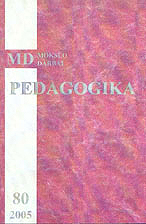Pedagogų požiūris į kultūros ugdymo temų integravimą mokykloje
Teachers’ Attitude Towards Integration of Consumer Education Topics in to Comprehensive School Curriculum
Author(s): Živilė Sederevičiūtė-Pačiauskienė, Vida Juškelienė, Manefa Miškinienė, Rūta DačiulytėSubject(s): Education
Published by: Vytauto Didžiojo Universitetas
Keywords: consumer education; sustainable development.
Summary/Abstract: Ineffective consumption in contemporary society raises a number of problems associated with public health and personal safety, human and environmental ecology, while insufficient economical education, ignorance of consumer responsibilities and rights among population is the common present phenomenon. Consequently, consumer education is one of the underlying areas; it is also mentioned as part of consumer policy in the EU Constitution. There is limit knowledge on teacher’s awareness in the field of consumer culture. The present study sought to reveal the attitudes of present and future Lithuanian teachers concerning integration of consumer education topics into the curricula of several compulsory subjects at secondary school. The study population consisted of 996 persons, 281 males and 715 females. Among respondents there were 472 secondary school teachers of different specialities (chemistry, biology, geography, technologies, physical culture) and 524 students of I–IV courses of the same specialties, future teachers. Anonymous questionnaire was used. Study results showed that present and future teachers are favourable to integration of consumer’s culture subjects into the comprehensive school curriculum; however they lack knowledge in this field. Both teachers and students accentuated consumer fields related to material values (as the articles of food, their assortment) more than those associated with sustainable development (ecology, recourses, life quality). Attitudes of the respondents were strongly associated with their age and sex, the subject that teachers have at school or study speciality for students. Teachers who have ever attended some consumer culture qualification course valued significance of consumer education at school more positively than others. Most respondents pointed out that at school children have to be introduced to the following themes: variety of consumer goods and services, aspects of safety and quality, consumer rights and their protection, but the knowledge associated with advertisement and its manipulations with consumer’s sense seemed to be not so important to them. The findings of the study also showed great interest of present and future teachers in consumer education. Most teachers and two third parts of students would like to extend their knowledge in this field; however, currently possibilities to raise qualification are insufficient.
Journal: Pedagogika
- Issue Year: 2005
- Issue No: 80
- Page Range: 9-14
- Page Count: 6
- Language: Lithuanian

